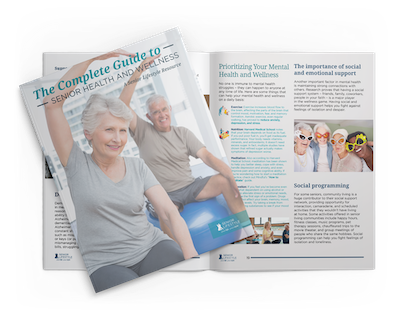Gratitude journaling can bring joy, perspective, and mental well-being to anyone’s life. One study seems to link higher levels of gratitude and lower levels of depression. For seniors, reflecting on life’s blessings, joys, and meaningful moments can be especially fulfilling.
This guide provides practical steps, prompts, and alternatives to help you start and maintain a gratitude journaling practice. Whether you’re a senior or caring for one, here are some ideas to begin journaling and help unleash the power of positive thinking.

Download The Complete Guide to Senior Health and Wellness
The key to living your “best life” as you age? Prioritizing your health. Check out our eBook, “The Complete Guide to Senior Health and Wellness,” to learn about the most important aspects of senior health and wellness.
Download the GuideThe Benefits of Gratitude Journaling
It’s important to understand why gratitude journaling is beneficial, especially for seniors. Studies have shown that regularly reflecting on what we’re grateful for can have positive benefits. It can lead to:
Improved Mental Health
Gratitude journaling helps shift focus from negative thoughts to positive ones, fostering a more optimistic outlook on life. This practice has been linked to reduced symptoms of depression and anxiety, common challenges faced by many seniors. By regularly acknowledging the good in your life, you can experience enhanced emotional resilience and a more balanced perspective.
Enhanced Emotional Well-Being
Expressing gratitude can lead to a stronger sense of emotional well-being. Seniors often face significant life changes, such as retirement, loss of loved ones, or health challenges. Gratitude journaling allows you to process these changes constructively, finding silver linings and moments of joy amid difficulties. This positive reinforcement helps build a more stable and content emotional state.
Better Sleep
Practicing gratitude before bed can improve sleep quality. Reflecting on positive experiences and feelings can create a calming effect, reducing the likelihood of going to bed with worries or anxieties. Seniors who engage in gratitude journaling report falling asleep faster and enjoying more restful sleep, contributing to overall better health.
Reduced Stress and Anxiety
Gratitude has a direct impact on stress reduction. By focusing on what you are thankful for, you can shift your mindset away from stressors and anxieties. This can lower cortisol levels, the body’s primary stress hormone, leading to a more relaxed and peaceful state of mind.
Greater Sense of Connection and Fulfillment
Gratitude journaling can enhance relationships by encouraging a focus on positive interactions and the appreciation of others. Seniors who regularly acknowledge the kindness and support they receive from friends, family, and caregivers often feel more connected and valued. This sense of connection and fulfillment is crucial for maintaining a high quality of life.
Getting Started with Gratitude Journaling
Here are a few steps to take as you begin your journey with journaling:
Choosing Your Journal
Selecting the right journal is an important first step.
Large-print journals are ideal if you have a vision impairment, offering easy-to-read text and ample space for writing. For those comfortable with technology, digital journals on tablets or computers can be a great alternative. Many apps offer customizable fonts and sizes to accommodate visual needs.
Devices with voice-to-text capabilities can be especially helpful if you have arthritis or other conditions that make writing difficult.
Setting a Routine
Consistency is key to establishing a lasting gratitude journaling habit. Pick a specific time of day that fits seamlessly into your routine. Morning journaling can set a positive tone for the day, while evening journaling can provide a peaceful end to the day.
Start small, journaling just five to 10 minutes a day. The goal is to make the practice enjoyable and sustainable, not overwhelming.
Find a quiet, comfortable place where you can focus on reflections without distractions. This can be a cozy chair, a spot in the garden, or a favorite corner of a home.
Basic Prompts to Get Started
Starting with simple prompts can make the process easier and more approachable. Here are some helpful ideas for your journaling:
- Daily blessings: List three things you’re grateful for today. These can be as simple as a sunny day, a phone call with a friend, or a good meal.
- Joyful moments: Describe a moment from today that brought joy. This could be a smile from a grandchild, a pleasant walk, or a favorite hobby.
- People in your life: Reflect on someone who made a positive impact on your life. Consider what they did and how it made you feel.
- Past blessings: Recall a happy memory and why it stands out. This helps connect the past with the present in a positive light.
- Nature’s gifts: Note something in nature that you appreciate. This could be the beauty of a flower, the sound of birds singing, or the warmth of the sun.
Deepening the Practice
Once you’re comfortable with the basics, explore more in-depth prompts and reflective activities.
For example, focus on a different theme each week such as family, health, nature, or personal achievements. This adds variety and depth to the practice.
You could also write a letter to someone you’re thankful for, even if you don’t send it. The act of writing can solidify feelings of gratitude and strengthen emotional connections.
Reflect on acts of kindness you’ve experienced or have given. Recognizing and appreciating kindness can boost their mood and reinforce positive behavior.
Finally, think about how you’ve grown as a person and the experiences that have contributed to your growth. This helps acknowledge progress and personal achievements.
Alternatives to Traditional Journaling
If you find writing or seeing difficult, there are several alternatives to consider:
Audio journaling: Using a digital recorder or a smartphone app, you can record your reflections verbally. This method is especially helpful for those with arthritis or vision impairments.
Visual gratitude boards: Create a gratitude board by pinning up photos, clippings, or drawings that represent things you’re thankful for. This can be a fun and creative way to visually focus on gratitude.
Sharing with partners: Talk out your daily gratitudes with a friend, family member, or caregiver. Discussing blessings out loud can be just as powerful as writing them down.
Guided journaling apps: Many apps offer guided journaling with prompts and reminders, often including voice-to-text options. Some popular apps include Day One, Reflectly, and Gratitude.
Live Gratefully at a Senior Lifestyle Community
Starting a gratitude journaling practice can be a transformative experience for seniors, offering a way to focus on the positive aspects of life. Whether through writing, speaking, or creative activities, there are many ways to cultivate and express gratitude. As you embrace the practice, you’ll enjoy the many benefits it brings to their well-being and happiness.
Senior Lifestyle communities can help seniors, and their family members, live a grateful life while we take care of the everyday needs of living, such as cleaning and meal preparation.
Find out more about Senior Lifestyle or schedule a visit today.

